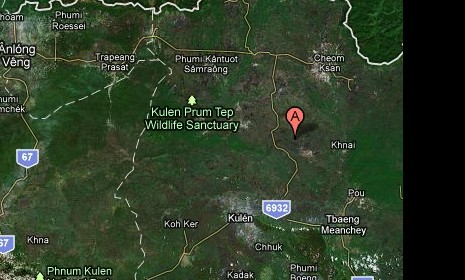How Google got involved in a land war in Asia
Google's "indecisive" approach to mapmaking, says John Gravois in Washington Monthly, has put the company in the middle of some messy international disputes

A free daily email with the biggest news stories of the day – and the best features from TheWeek.com
You are now subscribed
Your newsletter sign-up was successful
Since the launch of its online atlas in 2005, Google Maps has become a go-to reference for hundreds of millions of people around the world. Now, the company seems to be "intent on upending our very notion of what a map is," says John Gravois in Washington Monthly. Instead of aiming to create "one definitive map of the world," Google takes a more "agnostic" view of cartography — offering "'place browsers' that contain a multitude of views instead of univocal, authoritative, traditional maps." But this "indecisive rather than domineering" approach to drawing borders and naming places is creating some tricky politics for the company. Here, an excerpt:
"Google’s reach has become so vast that, whenever the corporation becomes involved in a geographical spat, it’s effectively an international incident. Border disputes have become a common vexation. Earlier this year, the government of Cambodia wrote a formal letter of complaint to the corporation—and shared it with the press—because of Google’s depiction of a disputed border with Thailand near an eleventh-century Khmer temple complex in Preah Vihear Province... Suddenly the corporation from Mountain View—which introduced its mapping platform in 2005 with the words “We think maps can be useful and fun”—was making headlines as a major party in a remote jungle conflict that has claimed at least seven lives in recent border skirmishes...
"It all points back to a simple question: What is Google? Is it a repository for all of our mutually exclusive claims, or is it a higher power to which we appeal? It cannot be both, and yet we seem to treat it as both. This tension may only heighten going forward."
The Week
Escape your echo chamber. Get the facts behind the news, plus analysis from multiple perspectives.

Sign up for The Week's Free Newsletters
From our morning news briefing to a weekly Good News Newsletter, get the best of The Week delivered directly to your inbox.
From our morning news briefing to a weekly Good News Newsletter, get the best of The Week delivered directly to your inbox.
Read the full article at Washington Monthly.
A free daily email with the biggest news stories of the day – and the best features from TheWeek.com
-
 The environmental cost of GLP-1s
The environmental cost of GLP-1sThe explainer Producing the drugs is a dirty process
-
 Greenland’s capital becomes ground zero for the country’s diplomatic straits
Greenland’s capital becomes ground zero for the country’s diplomatic straitsIN THE SPOTLIGHT A flurry of new consular activity in Nuuk shows how important Greenland has become to Europeans’ anxiety about American imperialism
-
 ‘This is something that happens all too often’
‘This is something that happens all too often’Instant Opinion Opinion, comment and editorials of the day